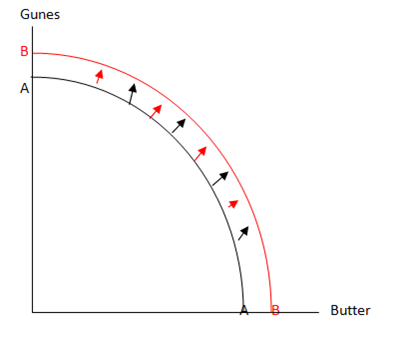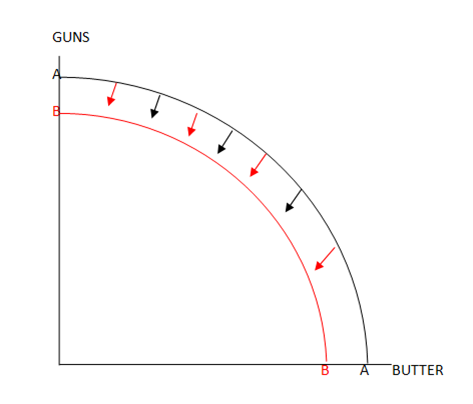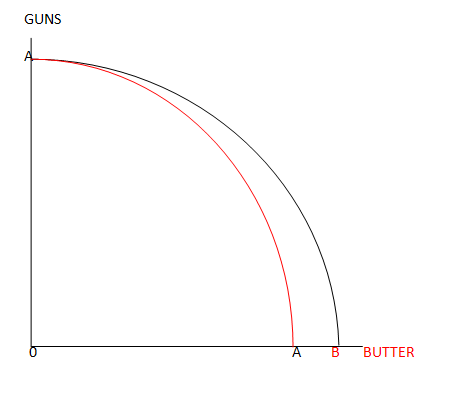SHIFTS IN PRODUCTION POSSIBILITY
CURVES
An economy’s production potential is constant changing.The Production possibility curve (ppc) will shift outward to the right because capacity to produce goods and services increases as shown below

Improvement of goods and services lead to the increase of Quality and Quantity,Labourforce,stock of capital goods (offices,factories,transport network power station and machinery) an increase in technical knowledge and improvement in training.
PPC INWARD TO THE LEFT as shown below:-

PPC curve shift to the left because economy’s production potential declines.This could occur due to the war or natural disaster which reduces a countries resources.
A CHANGES IN THE SLOPE OF THE PRODUCTION POSSIBILITY CURVE (PPC)

If changes occurred of one type of goods (BUTTER) the slope of the curve will change because of changes of quality or quantity of resources
example improvement of production technique in manufacture.
ECONOMICS RELATED TO OTHER SOCIAL SCIENCE
The economist of today is indebted to the historian of the part history. I.e. in this sense that they supplied material of the formulation of economics conclusion.
- ECONOMICS AND HISTORY
edu.uptymez.com
- The economist of today indebted to the historian of the part history i.e. the sense that they supplied material of the formulation of economics conclusion.
- Economists also can verify the correction of the old theory by comparing facts of the past and present.
- Economists like Malthus used history methods to explain his theory of production.
-
No historian can have a rough knowledge of history of a country if he does not study its economic condition from this sense. Therefore economics without history has no root and without economics it has no fruits.
2. ECONOMICS AND PSYCHOLOGY
- Psychology is that science of mind that it does with mental phenomena. Economics is the study of certain types of human behavior. Since behavior is conditioned by the mind, economics is related to psychology.
-
Wants, efforts and satisfactions which force the subject matter of economics are also mental phenomena e.g. The law of demand and supply are based on human behavior /psychology.
3. ECONOMICS AND ETHICS
Ethics is a science proper or right conductor. It prescribes the moral code of behavior and it is concerned with what might be?
The ethical standard of the people of a country is influenced by some extended economic condition, for example; the decision on which taxes to impose and which scheme to spend government money deceive their inspiration from morals of the society.
Economic as system that institutional arrangement.
4. ECONOMIC SYSTEM
edu.uptymez.com
Economic system is that an institutional arranged where by human and natural resources of an economy cooperate with each other to produce goods and service.
OR
Is a set of institution which a society decides what, how and for whom to produce. It is a framework theory which a society allocates scarce resources among competition uses or it is an allocate mechanism of the society.
OBJECTIVES / FUNCTIONS OF AN ECONOMIC SYSTEM
- To distribute output among the members of the societies and it must answer the question of who gets from the production of output.
- Allocation of the resources i.e. every system is responsible for the allocation of resources for production of goods and services.
- To provide maintenance and expansion of capital goods. Every system must expand capital goods.
- To adjust production and consumption i.e. to make sure production does not exceed consumption and vice verse.
-
To make social choice i.e. to decide on behalf of the government what kind of goods and services to produce.
TYPES OF ECONOMIC SYSTEM
edu.uptymez.com
There are three main types of economics system;-
- Socialist economic system.
- Capitalist economic system.
-
Mixed economic system.
SOCIALIST ECONOMIC SYSTEM
edu.uptymez.com
Command or socialist economic system is a type of economic system in which all major means of production are owned by the state.
FEATURES OF THE SOCIALIST OR COMMAND ECONOMY
-
Collective ownership.
All major means of production such as factories, banks, schools hospital, and farms e.t.c are owned by state.
-
All economic decisions are made by the state.
Economic decisions about what to produce, how to produce and to whom to produce are made by the country planning authority.
-
Exploitation is minimized and classes are not in extent.
Profit is shared equally among the members and classes do not exist because wealth in the socialist economy is owned equally by all members.
-
Lack of freedom.
In command economy producers are not free to make decisions on the allocation of scarce resources. What is to be produced is determined by the state consumers; likewise producers are not free on what goods and services to produce to the consumers.
- There is equality among the members in a command economy. Majority of people have access to the national output as the state ensures equality in the nglish-swahili/distribution” target=”_blank”>distribution of wealth.
- Low quantity and quality of outputs due to lack of competition.
-
Production is mainly gearing at maximizing utility of the society.
ADVANTAGES OF COMMAND ECONOMIC SYSTEM
-
It promotes welfare of the majority.
Under this system the government ensures achievement of minimum standard of living for the members of the society by using different approaches like;- provision of the free social subsidies etc.
-
Wastage of resources is minimized.
Proper planning on the allocation of resources ensures efficiency and full utilization of the resources.
- Greater ability to tackle externalizes i.e. environmental pollution should be tackled into account when deciding up on the patterns of production. Command economy can easily deal with harmful effects of production activities.
- There is no exploitation between people hence there is harmonious relationship between them.
- The system is able to minimize inequalities in the nglish-swahili/distribution” target=”_blank”>distribution of income and wealth unlike the market economy.
-
Economic and social crises can be avoided. Since a command economy is planned, the government is able to control various macro-economics variables like money supply, investment, consumption, expenditure, tax etc.
This economic crisis such as inflation, recession, depression, unemployment, e.t.c can be avoided.
DISADVANTAGES OF COMMAND ECONOMIC SYSTEM
edu.uptymez.com
1. Lack of freedom of choice.
Under this system, freedom by producers and consumers over what to consume and produce are very limited.
2. Disnglish-swahili/courage” target=”_blank”>courage individual efforts or ineffectiveness to work due to lack of private gains.
3.Inefficiency in production the system is characterized in efficiency due to lack of competition low technology.bureaucratic decisions, corruption, poor planning, too much protectionism to domestic industries
etc.
4. Information cost of gathering information about what, how, for whom to produce is likely to be very high as it requires experts, planners, administrators and engineers etc.
5. Difficult in estimating demand without price sign us to estimate existing and future pattern of demand for goods and services becomes difficult.
NB; socialism is still one of the economic system that today is practiced in Cuba, North Korea and China.
II. CAPITALIST ECONOMIC SYSTEM
The system is also known as market economy, unplanned or free enterprise economy. Capitalist economic system refers to the type of economic system in which all major means of production are owned by individuals and privates companies, with little government intervention. Examples of the countries which practice this system are USA, UK, Germany, France etc.
FEATURES OF CAPITALIST SYSTEM
- There is private ownership of the major means of production such as land and capital.
- There is freedom of choice. That is producers and consumers can make decisions on what, where and for whom to produce and consume.
- Production is aimed at profit maximization i.e. for self interest resources.
- Reliance and price mechanism as a means of allocating resources. Under capitalist economy all problems of what is to be produced where to produce and for whom to produce are answered by the price mechanism.
- There is limited role by the government.i.e the government has little intervention over the allocation of the economic resources.
- Competition. Under capitalist economy there is free entry of firms in production. These firms compete for resources and market. Such competition results to the increase in efficiency in production.
- There is existence of classes. Under this system the society is divided into classes. That is the class of haves and have not i.e. the haves are those who own the major means of production and they have not are those who do not own the major means of production.
edu.uptymez.com
ADVANTAGES OF CAPITALIST ECONOMIC SYSTEM
-
Greater freedom of choice (consumer sovereignty).
This means that consumers are seeking to maximize their utilities, having the freedom to make choices from wider range of goods and services.
- Competition may result into the increased efficiency in production i.e. to produce goods of high quality to win the competition.
-
Low burden to the government.
In this system, the government takes very few responsibilities in the provision of essential services.
- High private initiatives. There are high motives to produce by private producers because of private profit, freedom of ownership and freedom of production.
-
Proper allocation of the resources.
Price mechanism eliminates possible in is allocation of resources as producers use their resources to produce only goods wanted by the societies or consumers, unlike in the socialist economy, where production of goods produced may not be wanted by the people due to poor planning.
DISADVANTAGES OF CAPITALIST ECONOMIC SYSTEM
-
Exploitation is dominant.
Poor people are de-private of all means of survival and are forced to sell their labor power to the capitalists who exploit them by paying them with low wages.
-
It leads to the economic and social crisis.
The economic system is not planned as the result it is frequently affected by economic instabilities like inflation, depression, over production, unemployment etc.
-
It leads to wastage of resources.
Extreme competition behaviors of firms results in misapplication of resources, hence overproduction or harmful production etc.
- If leads to distortion in consumer’s choices. Consumer’s choices may be distorted by persuasive advertising, in which consumers may buy commodities of sub-standard due to the convincing power of the suppliers i.e. through under advertisement.
-
Welfare of the majority is endangered.
Firms under this system compete to maximize profits. Under profit motives they often use resources to produce luxury goods instead of public goods. E.g. health services, education, e.t.c, which promote the living standard of people.
edu.uptymez.com
6. Existence of classes.
That is the rich and poor classes. The classes exist due to unequal access to the major means of production.